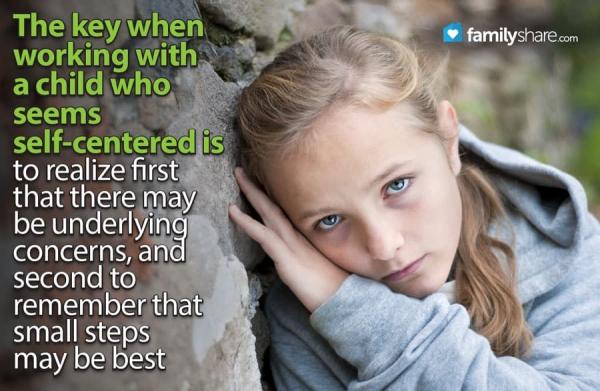
Young children are typically unaware of other children around them when they first learn to play. As a child grows older, she will begin to notice and interact with others. In most cases, a child learns how to share, play nicely, and cooperate, however, in a few cases, he will become self-centered or worried only about himself and how various situations affect him. If you are facing this issue with a growing or older child there are things you can do to help combat it. Here are some helpful tips to try:
Model gratefulness
As always, you are your child's best example. By watching how you interact with others your child learns to act accordingly. Your child learns to pattern behaviors from you. If you want to teach your child to be less self-centered let him see you showing an attitude of gratitude. The more grateful and appreciative you are to others the more your child will notice and follow suit.
Serving others
While you can teach them a lot through example, there are ways you can teach. Involve your child in a service project where he gets the opportunity to serve others. This can be serving other members of your family through assigned chores, serving less fortunate individuals by volunteering at a soup kitchen, or through community service programs and projects. Giving your child responsibilities to serve others allows them to learn about empathy, responsibility, and service. By doing chores around the home or helping a younger sibling they learn they are part of the bigger picture and part of a family that each has a role and is needed to serve each other. By serving others outside the family they may learn empathy and be grateful for those items they do have and others don't.
Address underlying concerns such as, fears and anxieties
A child may seem more self-centered when they are, in fact, nervous or afraid. He may withdraw from situations not because of any sense of self importance, but because he is uncomfortable. It is important to take the time to determine if any underlying causes may need to be addressed. Sometimes, helping to solve a self-centered problem may be as easy as spending a little extra time with your child discussing their concerns and letting them know that they are loved and respected.
The key when working with a child that seems self-centered is to realize first that there may be underlying concerns, and second to remember that small steps may be best. Working with your child to understand the importance others have in relationships, how to support and care for each other, and how to emphasize with those that are less fortunate are beginning ways to help them take the focus off of themselves and turn it to others.

